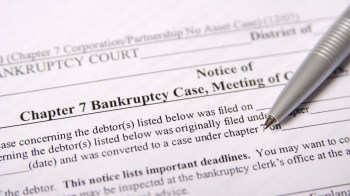Personal bankruptcy filings on the rise
TEXT OF STORY
Tess Vigeland: Personal bankruptcies are one of the hallmarks of the Great Recession. Just last month, more than 130,000 Americans filed for protection from their lenders. That number was down from April, but up almost 10 percent from the same time last year, according to the American Bankruptcy Institute. Almost one and a half million Americans filed last year. That number is expected to grow in 2010.
Dan Bobkoff of WCPN in Cleveland has the story of what it’s like to declare that you’ve reached the bottom of your financial safety net.
Dan Bobkoff: If you find yourself in Blake Brewer’s office in Independence, Ohio, you’ve probably hit the end of the road. Brewer is a bankruptcy attorney, and that means he’s also part therapist.
Blake Brewer: Yeah, we keep a box of tissues handy on the desk, because there are a lot of tears shed.
Bankruptcy is embarrassing. It feels like failure. But it can also be liberating.
Serena: I guess between switching credit cards… Sorry, I get emotional, because this is just like… Um, between taking the gamble with different credit cards: 0 percent interest rates, borrowing money from family and friends, I’ve done everything that I possibly could.
This single mom didn’t want her real name used so we agreed to call her Serena. She’s 36, lives in Cleveland with her three-year-old daughter and tried everything to avoid ending up talking to a bankruptcy attorney. She used to work three jobs, but when her daughter came along, she cut back to one, so she’d have time with her. But her $48,000-a-year salary wasn’t enough to pay the mortgage and support her child. So she racked up a lot of credit card debt.
Serena: It adds up really quick. You don’t realize in a month how much money you can spend even not even doing fun stuff. Just putting food on the table, or buying things for school and paying for day care.
Attorney Blake Brewer says more and more of his clients are people like Serena: People who, because of changing circumstances, have had to take drastic steps.
Blake Brewer: I don’t see too much of people who have lived an extravagant lifestyle. Most of the people who come to see me have been living in reduced circumstances for some time trying to pay the credit card bills.
But there are also those who fell into the credit card trap. Genia was 18 when she got her first credit card.
Genia: Yeah, yeah, I would say 2006 was when I really got most of my credit thrown at me. I actually had a credit card with like a $6,000 limit.
Genia, who asked us not to use her last name, spent the next four years using as many as eight credit cards to power her through college. She charged school books and some of her tuition. And, she bought some stuff she probably didn’t need, like new clothes. She graduated with $30,000 in credit card debt.
Genia: Eventually, you get to a point where the interest rates are so high and the monthly payments are so high that I couldn’t physically make payments anymore.
Add to that one of the worst job markets in years, and you have a recipe for financial meltdown. Collections agencies started calling her parents and grandparents who were…
Genia: Shocked, shocked. I was always the good kid growing up, so nobody expected that I would get into that kind of trouble. But they knew that I was willing to do whatever it took to fix the problem, and therefore, they were willing to help me.
Filing for bankruptcy became a relief, but still felt a bit like a failure.
Genia: Well, I was extremely independent, you know. I mean I had a car in my name. I had all these things. But, I had fallen, and it was really hard, especially to be dependent on other people, which I never have been.
No one will tell you going through bankruptcy is fun. But it’s so common now, attitudes are changing.
Sam Gerdano heads the American Bankruptcy Institute. He says that with so many big corporations defaulting, there’s less of a stigma now.
Sam Gerdano: The idea that individuals have a higher moral obligation than these other entities that have sought protection under the bankruptcy laws, I think, is a bit dated.
And as Serena, the single mom, starts the bankruptcy process, she can take it from Genia that leaving bankruptcy court can feel great.
Genia: You walk out of there feeling like you’ve got a set of wings and you want to fly. It’s a pretty relieving feeling.
Genia says she’s much better now about budgeting and buying generics at the supermarket. But she is leasing a new car that’s $330 a month. It’s in her roommate’s name; he’s got good credit.
For Marketplace Money, I’m Dan Bobkoff in Cleveland.
There’s a lot happening in the world. Through it all, Marketplace is here for you.
You rely on Marketplace to break down the world’s events and tell you how it affects you in a fact-based, approachable way. We rely on your financial support to keep making that possible.
Your donation today powers the independent journalism that you rely on. For just $5/month, you can help sustain Marketplace so we can keep reporting on the things that matter to you.


















